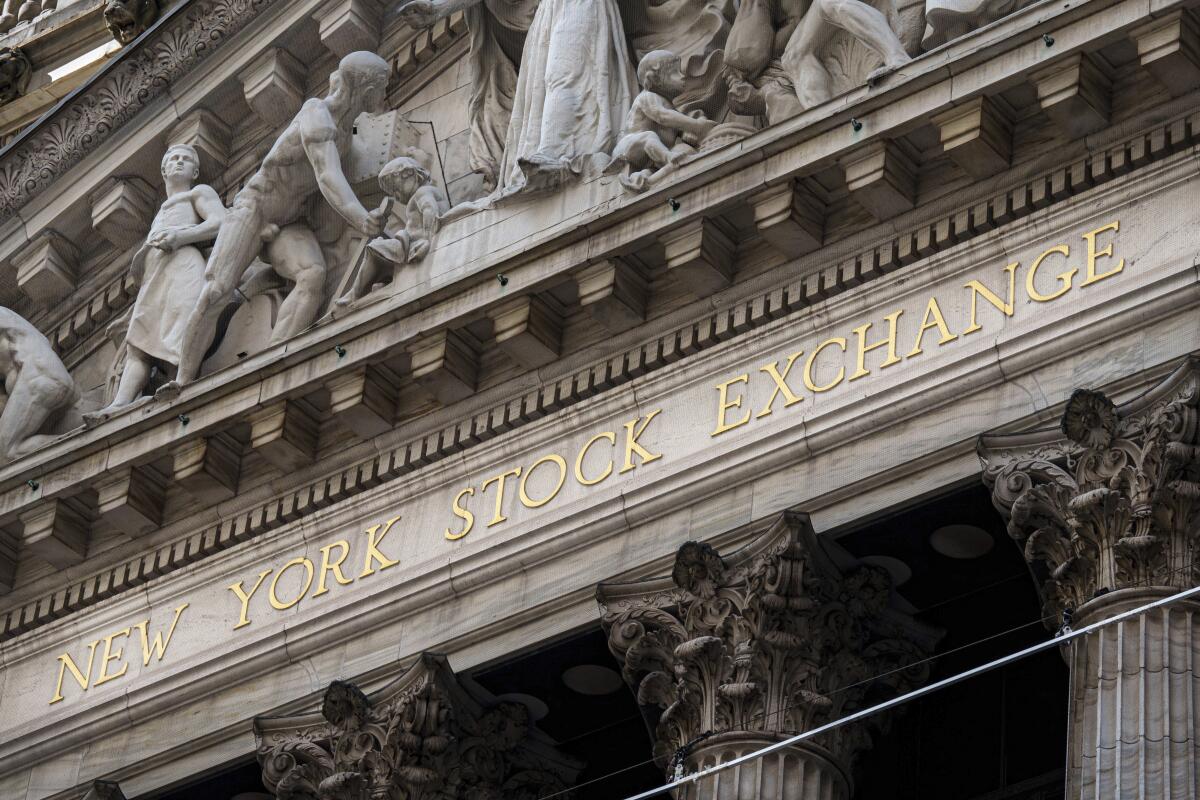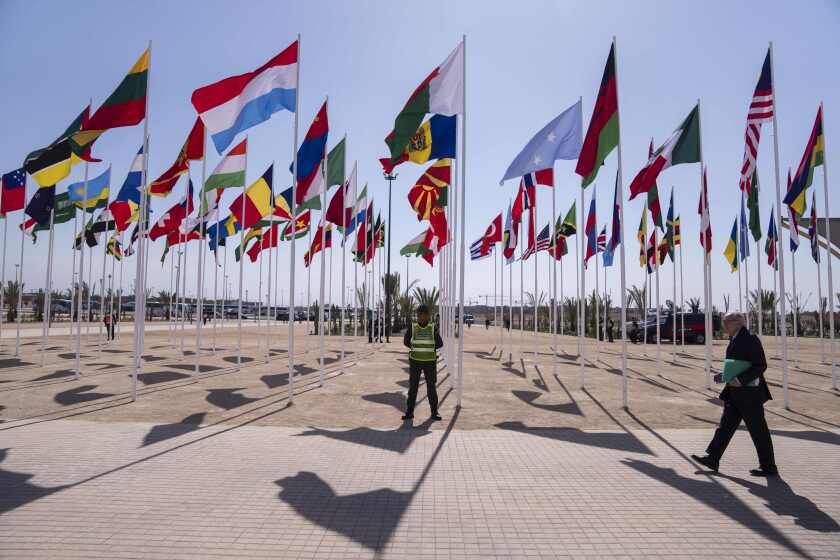Wall Street rises as pressure relaxes from the bond market

- Share via
U.S. stocks rose Tuesday after pressure relaxed on Wall Street from the bond market.
The Standard & Poor’s 500 index gained 22.58 points, or 0.5%, to 4,358.24. The Dow Jones industrial average rose 134.65 points, or 0.4%, to 33,739.30, and the Nasdaq composite climbed 78.60 points, or 0.6%, to 13,562.84.
Some of the strongest action was in the bond market, where Treasury yields eased after trading resumed following a holiday Monday. It was the first opportunity for yields to move since the weekend’s surprise attack by Hamas on Israel injected caution into global markets.
Perhaps more impactfully, it was also the first trading for Treasury securities since two Federal Reserve officials gave speeches that traders took as a suggestion that the Fed may not raise its overnight rate again. The comments helped U.S. stocks swing from early losses to gains Monday.
The yield on the 10-year Treasury fell to 4.65% from 4.80% late Friday, which is a considerable move for the bond market. The two-year Treasury yield, which moves more on expectations for the Fed’s actions, dropped to 4.97% from 5.09%.
Treasury yields had jumped last week to their highest levels in more than a decade, following the lead of the Fed’s main interest rate, which is at heights unseen since 2001. They’ve been the main reason for the stock market’s stumbles since the summer, as worries rise that the Fed will keep its federal funds rate at a high level for longer than Wall Street hopes.
Biden issued an apparent warning to Hezbollah: “To any country, any organization, anyone thinking of taking advantage of the situation, I have one word: Don’t.”
High rates and longer-term yields knock down prices for stocks and other investments, while slowing the economy in hopes of undercutting high inflation.
But the swift rise in the 10-year Treasury yield has helped pull the average long-term mortgage rate up to its highest level since 2000, and Fed officials have intimated such moves may help contain high inflation on their own.
“I actually don’t think we need to increase rates anymore,” Raphael Bostic, president of the Federal Reserve Bank of Atlanta, said in remarks before the American Bankers Assn. on Tuesday. “I think we are at a good place in that regard.”
A day earlier, two other Fed officials made statements that traders saw as a hint that no more rate hikes may be coming. One was Philip Jefferson, who is the Fed’s vice chair. The other was Dallas Fed President Lorie Logan, who has been among the more “hawkish” Fed members pushing for tough interest rates to battle high inflation, said Solita Marcelli, chief investment officer for the Americas at UBS Global Wealth Management.
The Fed’s next announcement on interest rates is due Nov. 1. Traders are now betting on a nearly 73% chance that the year will end without any more Fed rate hikes, according to data from CME Group. That’s up from the 53% chance seen a week ago.
The International Monetary Fund on Tuesday lowered its forecast for global economic growth next year, in part because of the effect of high rates around the world, though it upgraded its forecasts for U.S. economic growth specifically.
Fighting in Gaza is the latest threat for the world’s economy, particularly after it pushed oil prices higher Monday. Although the region under conflict is not central to the production of oil, the fear is that the violence will spill over into the politics surrounding the crude market. That in turn could hurt the flow of petroleum.
A barrel of U.S. crude fell 41 cents to settle at $85.97, giving back a bit of its $3.59 leap a day before. Brent crude, the international standard, fell 50 cents to $87.50 per barrel.
The International Monetary Fund warns that the world economy has lost momentum because of interest rate hikes, the Ukraine war and geopolitical rifts.
On Wall Street, some of the companies whose stocks made big moves Monday declined. Stocks of defense contractors that make weapons gave back some of their big gains, and Northrop Grumman slipped 1.4%. L3Harris Technologies fell 1.5%, though both are still up more than 8% for the week.
Airline stocks also clawed back some of their losses. They have already suspended flights into and out of Israel, and they count fuel among their highest costs. Delta Air Lines rose 1.6% and United Airlines climbed 1.5%.
PepsiCo rose 1.1% after it reported stronger profit and revenue for its latest quarter than analysts expected. The snack and beverage company charged higher prices for its products during the quarter, which helped to make up for a drop in how much it sold. It also raised its profit forecast for profits for the full year.
Later this week, the momentum will pick up for big companies reporting their results for the summer. Delta Air Lines, JPMorgan Chase and UnitedHealth Group are among the big names on the calendar.
This could be the first quarter in a year that S&P 500 companies report stronger profits versus year-earlier levels, and analysts are forecasting a broad 0.3% decline, according to FactSet.
In stock markets abroad, indexes rallied in Europe but were mixed in Asia.
In the latest signal of trouble in China’s rattled real estate development industry, Country Garden warned that it probably won’t be able to make some debt repayment when due and that its sales were under “remarkable pressure.” The company had earlier been hailed as a model real estate company by Chinese authorities.
Economists are preoccupied with making predictions about the future path of the U.S. economy, but keep getting fooled by the truth.
AP writers Matt Ott and Elaine Kurtenbach contributed to this report.
More to Read
Inside the business of entertainment
The Wide Shot brings you news, analysis and insights on everything from streaming wars to production — and what it all means for the future.
You may occasionally receive promotional content from the Los Angeles Times.













